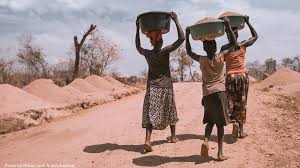Child labour has become a social problem that many have turned a blind eye to as it is mostly associated with the existing costom and traditions of The Gambia. It is widely believed that such labour prepares the child to be responsible and would help him or her to fully take up responsibiltes in the future.
In some communities, child labour is viewed as hard work in an honourable way. Parents tend to be more proud of the child that sells in the streets and comes with money at the end of the day than the child that goes to school.
Kaddy(surname withheld), was a victim of child labour. She lived with both her parents in the village, but due to financial difficulties, she was given to her aunt who lived in Talinding and never had a child. Though they wanted Kaddy to help her aunt with household chores, they also wanted her to go to school. However, she only ended up doing household chores, chores that were so heavy for a girl of her age.
At that tender age, Kaddy was solely responsible for the household chores. She also started providing financial assistance for her aunt by selling in the streets every evening. For a person who has followed cases like this in the country, the events that followed were highly predictable.
As she was getting older and seeing her peers go to school, Kaddy became fascinated with the idea of going to school. She tried to convince her aunt to take her to school for the longest time, but to no avail. When she finally succeeded in persuading her, another problem raised. Since her aunt was not financially stable to provide her with the basic school necessities, Kaddy had to continue selling in the streets to be able to provide them for herself.
Kaddy, now 23, is still going to high school. Now in grade 11, she continues to finance her schooling as her father who gave her away to her aunt is late and her mother does not have the means to support her schooling. She is sad about the delay in her schooling.
“I should have been in the university like most of my mates, but due to the late starting of school, I am still going to high school at my age,’’ she lamented.
Kaddy sells homemade juices; this is a trade she has mastered very well from her childhood days.
“I usually prepare ‘Wonjo’, fill it in bottles and put them in the fridge and sell the for D5 per bottle. This is how I am trying to keep myself in school,’’ she explained.
Bureau of International Labor Affairs’ 2020 findings on the worst forms of child labour in The Gambia indicated that The Gambia made a minimal advancement in efforts to eliminate the worst forms of child labour. This is mainly due to the inadequate implementation of laws in the country.
In an interview with The National Coordinator of Child Protection Alliance, Mr. Lamin Fatty stated that circumstances hindering the effective enforcement and implementation of the laws and policies prohibiting child labour could squarely be the lack of commitment towards law enforcement and implementation of policies.
He added that the lack of understanding of issues relating to child labour concerning the laws amongst actors is also another contributing factor.
“Our cultures and customs have normalised child labour as a way of teaching children to be responsible, thus engaging them in all forms of labour regardless of the provisions prohibiting children from being engaged in any form of labour, for instance, Section 43 ‘Light Labour’ of the Children’s Act has explicitly prohibited children from been engaged in any form of labour, unless they attain the age of sixteen years’’.Mr. Fatty explained.
The Child Protection Alliance (CPA) is a Civil Society Organisation that works within the legal frameworks of child protection within the context of National, Regional and International legal frameworks. Since its establishment in 2001, CPA has been rigorously engaged in a lot of work geared towards promoting the protection and Welfare of children through capacity building of child protection actors, community-based structures like the Community of Child Protection Committees and schools.
Research has shown that child labour deprives children from attaining higher education as most child laborers between the ages of 5 and 14 both work and attend school, which hinders their learning experience. Some child workers drop out after primary school or never attend school at all. Even though The Gambia Government makes the first six years of primary school free and mandatory, the primary school completion rate is at 70 percent.
Another research has shown that child labour hampers the physical, mental, moral spiritual and social development of a child which negatively influences the academic performance of the child and school at large, which will eventually deprive the nation of the most valuable and potential
human capital.
Child labour is said to be the engagement of a class of persons, known as children below the age of 18 in activities that do not commensurate with their age, therefore, resulting in physical; mental; moral, spiritual and social development impairment.
Sometimes, children undertake different activities to subsidize household income to ensure family survival or for their own upkeep. Again, some adult employees bring along their children to assist them in their work which is mostly around school time, especially for primary school children. This often leads to low performance at school or completely dropping out of school.




